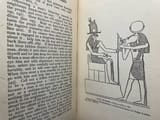Search results for "5958ec12017256977c985354fbf9ab02" in md5 (2)
HORUS
8/23/2025, 1:22:42 AM
No.40953622
>>40953538
>When thou seest a man stumble (or, going astray) go with him and help him on his way. Call not a fellow townsman who happens to be a wrong-doer a 'chief of robbers,' and because a man is thy personal enemy brand him not as a sedition-monger. Do nothing that will make the blind man a laughing-stock to his neighbours. Moreover, mock not the dwarf because of his form and colour, and interfere not in the affairs of the man with a physical defect to injure him. When a man in trouble or suffering some affliction, do not praise to him the man who has caused his calamity. Even if thou hast a dislike for a man show thyself friendly to him. Give thy arm to the old man who is drunk, and pay respect to him in the presence of his family.
>Crush not the poor man who has said something that is good, letting the rich man who has only uttered windy platitudes go unrebuked.
>In very definite words Amen-em-apt calls upon the scribe to be both accurate and honest in his work. The scribe's finger is not a finger only, but the beak of the ibis-god Thoth, the great divine scribe who presided over the weighing of the deeds and hearts of men at the Great Judgement. As we see from the vignette in the Book of the Dead, Thoth wrote down with accuracy the result of the weighing, which was personally supervised by the Ape-god, his assistant. Wherever the scribe may be, let him remember that the Ape-god, who dwells in Per-Khemenu (Hermopolis, the city of Thoth), is watching all Egypt, and will know when the scribe makes a mistake wilfully or accidentally. If the scribe continues to make mistakes, i.e., to falsify his texts, the god will withdraw his emoluments, and his son will fail to obtain employment.
>"Bear these things in thy mind always," says Amen-em-apt, "and thou shalt see thy posterity."
HORUS
8/23/2025, 1:21:00 AM
No.40953614
>>40953538
>When thou seest a man stumble (or, going astray) go with him and help him on his way. Call not a fellow townsman who happens to be a wrong-doer a 'chief of robbers,' and because a man is thy personal enemy brand him not as a sedition-monger. Do nothing that will make the blind man a laughing-stock to his neighbours. Moreover, mock not the dwarf because of his form and colour, and interfere not in the affairs of the man with a physical defect to injure him. When a man in trouble or suffering some affliction, do not praise to him the man who has caused his calamity. Even if thou hast a dislike for a man show thyself friendly to him. Give thy arm to the old man who is drunk, and pay respect to him in the presence of his family.
>Crush not the poor man who has said something that is good, letting the rich man who has only uttered windy platitudes go unrebuked.
>In very definite words Amen-em-apt calls upon the scribe to be both accurate and honest in his work. The scribe's finger is not a finger only, but the beak of the ibis-god Thoth, the great divinescribe who presided over the weighing of the deeds and hearts of men at the Great Judgement. As we see from the vignette in the Book of the Dead, Thoth wrote down with accuracy the result of the weighing, which was personally supervised by the Ape-god, his assistant. Wherever the scribe may be, let him remember that the Ape-god, who dwells in Per-Khemenu (Hermopolis, the city of Thoth), is watching all Egypt, and will know when the scribe makes a mistake wilfully or accidentally. If the scribe continues to make mistakes, i.e., to falsify his texts, the god will withdraw his emoluments, and his son will fail to obtain employment.
>"Bear these things in thy mind always," says Amen-em-apt, "and thou shalt see thy posterity."
